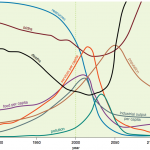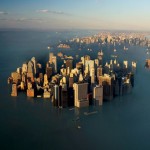
In my blog of February 28 I said that in in order to heal the planet – us – we need new leadership. I then promised to specify more in detail what I meant by this.
The leadership we need I call spiritual leadership. In my book about this I described that as a leadership that (quote):
- is based on unity of minds. In other words a realisation of a connection between myself and another, myself and the world. . . . What I do with myself, I do with the surroundings and what I do with the other I also do with myself. It is also the awareness that the other may be different to myself but then again not really. This has significant consequences in the way in which I communicate with the other.
- is based on vision. . . an image of that which I want to create, possibly together with others, which is fed through my desires, my aim in life, my actual talents etc. It is therefore something from the person as a whole, from the mind, body and soul and not only something intellectual such as an aim.
- is based on honesty. With this I mean: facing up to reality in a direct manner. This concerns both the external reality and the reality within ourselves. This is not always easy. We have the tendency to perceive both the external and internal world in a more positive light (or even more negative) than it actually is. It takes courage in order to take an honest look at the world around us and to look inside ourselves without guilt, anger, disapproval or judgment.
I also wrote: . . . spiritual leadership has nothing to do with gurus or sects or such like. It is a form of leadership which can occur anywhere, from the top to the bottom, in the business sector, in the government, in education and in the health care sector, in the arts and in the church, with men and women, with young and old and yes, even in politics.
So the first step is to develop this leadership in ourselves by growing our own awareness and taking responsibility. But in order to heal the planet we also need guides or leaders who are capable of mobilizing multitudes, creating a mass movement; and at the same time have the characteristics I mentioned above.
What can we do to promote this kind of leadership? Two things. In the first place we can support this kind of leadership wherever we see it developing, even if it is only in an early stage of development. We can do this through voting, joining a movement or mass demonstration, making conscious choices in our behavior as consumer or citizen, etc. The second way is avoiding any consent or endorsement with (political or commercial) actions that are damaging the planet, or even actively protesting against it by any form of nonviolent action, like – again – participating in a public demonstrating, signing petitions (Amnesty International, Greenpeace, Avaaz) or just speaking up when necessary, even among friends, etc.
We can support our action by daily prayer: for the healing of the planet and for the wellbeing and success of the leaders we endorse. Anyway: if we care for our our planet (including ourselves and our family and offspring) we should move, both inwardly and externally, and not sit on our hands and wait. Because again: our planet is ill, even though we don’t feel it. Be aware! In the spirit of the resurrection, let’s heal and celebrate life! Happy Easter!
Disclaimer: I apologize for mistakes in my English. Blogs are cursory – not stuff for correction by a native speaker

 In 1972 the study Limits to Growth was published. It was an overview of several so called future scenarios. It sometimes is said that the study didn’t predict the future correctly, because it didn’t predict climate change. But that was not the theme of the study. The study showed that unlimited growth in a finite ecosystem (planet earth) is not possible. Either one has to limit growth by deliberately changing some of the input variables of the system or the system will collapse spontaneously. And because we didn’t fundamentally change our goal (unlimited growth), now we can see the beginning of the collapse. So the study is more up-to-date than ever.
In 1972 the study Limits to Growth was published. It was an overview of several so called future scenarios. It sometimes is said that the study didn’t predict the future correctly, because it didn’t predict climate change. But that was not the theme of the study. The study showed that unlimited growth in a finite ecosystem (planet earth) is not possible. Either one has to limit growth by deliberately changing some of the input variables of the system or the system will collapse spontaneously. And because we didn’t fundamentally change our goal (unlimited growth), now we can see the beginning of the collapse. So the study is more up-to-date than ever. Then we are ready for prayer: “Thy will be done, on earth as it is in heaven.” Needless to say that it is not necessary to practice this in an orthodox christian way. If you want to approach this attitude from a Christian viewpoint you should rather think of gnosis
Then we are ready for prayer: “Thy will be done, on earth as it is in heaven.” Needless to say that it is not necessary to practice this in an orthodox christian way. If you want to approach this attitude from a Christian viewpoint you should rather think of gnosis 